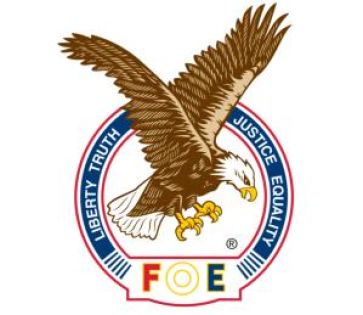
Fraternal Order of Eagles (F.O.E.)
The Fraternal Order of Eagles (F.O.E.) is a nonprofit fraternal organization founded in 1898 in Seattle, Washington. It began when a group of theater owners and entertainers formed a social club to promote camaraderie and mutual assistance.
Todays Eagles
Over time it expanded into an international association of local lodges called Aeries, aided by their Auxiliaries, internal groups and youth groups. The organization emphasizes fellowship, community service, and organized charity while providing members with social, civic, and leadership opportunities.
Mission
The mission of the F.O.E. is grounded in the principles of liberty, truth, justice, and equality and is often summed up by the motto: People Helping People. The organization seeks to unite individuals in friendship and convert that fellowship into meaningful acts of service, relief, and advocacy that improve the quality of life for individuals and communities.
Purpose
The primary purpose of the Fraternal Order of Eagles is to promote benevolence and civic responsibility through organized, member-driven programs. The F.O.E. mobilizes members to raise funds, provide volunteer service, and support public initiatives that enhance community welfare. It aims to foster moral character, leadership, and mutual support among members so they can collectively address local needs.
Core Activities and Programs
Charitable giving is central to the Eagles activities. Local Aeries and national programs raise funds for medical research, patient care, and community health projects; historically supporting areas such as heart disease, diabetes, kidney disease, and cancer research.
The organization also supports children's hospitals, disaster relief, veterans services, and scholarships. Beyond fundraising, Aeries run community events, youth activities, and service projects that provide direct, local impact.
Advocacy and Historical Impact
The F.O.E. has a history of civic advocacy on behalf of working families and vulnerable populations. In the 20th century the organization supported social welfare measures and public policies that expanded social protections for families, reflecting its belief that well-crafted public policy combined with local action strengthens communities. While the specifics of advocacy have evolved, public engagement remains part of the Eagles tradition.
Organizational Structure
The F.O.E. is organized into local Aeries (the principal meeting units), Auxiliaries (women's units in many jurisdictions), a Junior Order for youth, and internal groups such as Aerie Business Club and Eagles Riders.
Each Aerie elects local officers, follows bylaws and rituals, and coordinates charitable and social activities. State/provincial and national levels provide broader direction, programs, and coordination among local lodges.
Values and Symbolism
The eagle as a symbol represents strength, vision, and freedom; qualities the organization aspires to in both personal character and public service. Core values emphasized by the F.O.E. include compassion, integrity, mutual aid, and civic-mindedness. Members are encouraged to practice ethical behavior and to turn personal fellowship into collective good.
Community Role and Local Impact
At the community level, Aeries act as hubs for volunteerism and local philanthropy. Typical local initiatives include scholarship programs, youth sports and activities, veterans outreach, equipment or facility donations to hospitals, and disaster response efforts. By combining social fellowship with planned charitable action, the F.O.E. aims to produce measurable improvements in neighborhoods where it operates.
Summary
In essence, the Fraternal Order of Eagles unites people through social fellowship and channels that unity into charity, advocacy, and community-building. With a long history dating to 1898, the F.O.E. continues to pursue a mission of People Helping People, working to uplift individuals and strengthen communities through organized benevolence, civic involvement, and the promotion of moral and civic values.
Powered by: Joxall Marketing Group - www.jxlmkt.com

 Home Page
Home Page